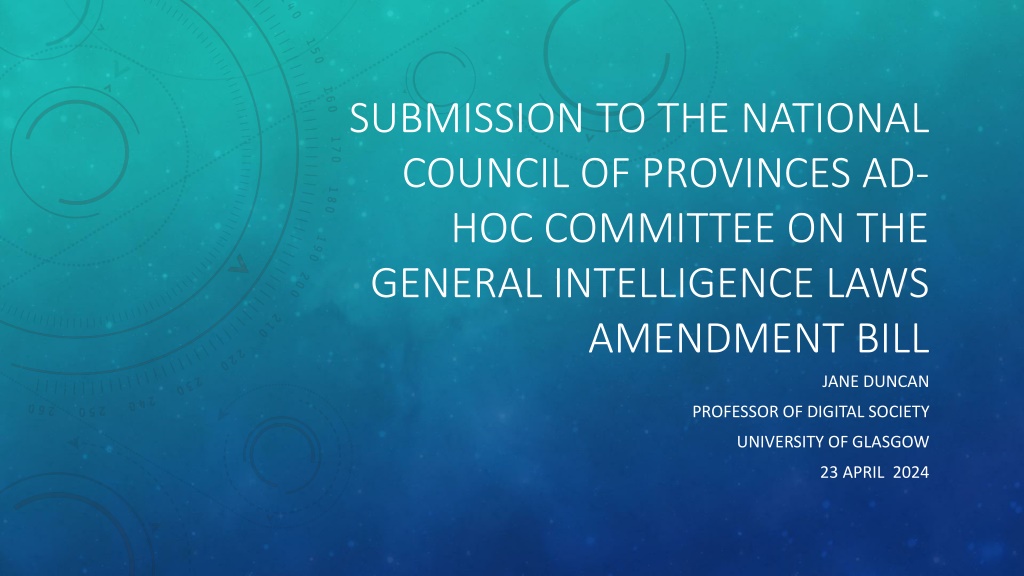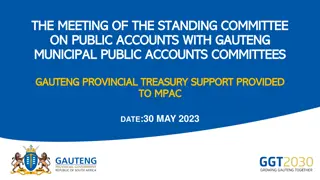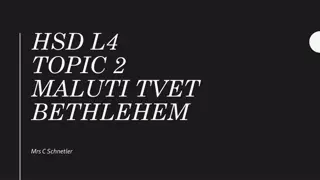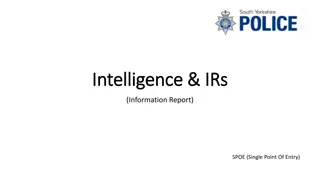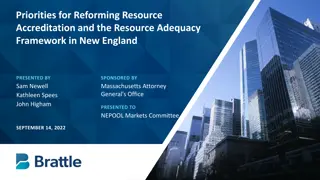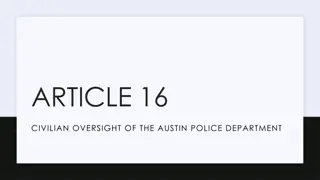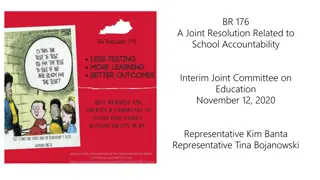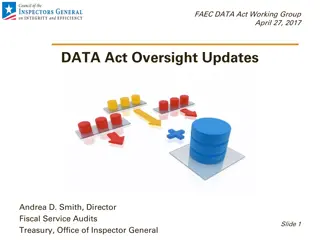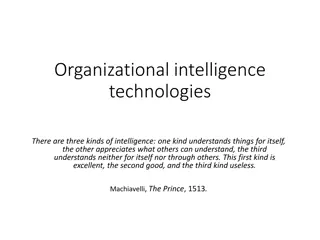Reforming Intelligence Laws for Effective Oversight and Accountability
Urgent completion of the National Security Strategy and architectural review is crucial before amending intelligence laws. The establishment of a dedicated Ministry of Intelligence, clarification of definitions, and enhancing oversight mechanisms are recommended to address gaps and improve the intelligence services in the nation.
Download Presentation

Please find below an Image/Link to download the presentation.
The content on the website is provided AS IS for your information and personal use only. It may not be sold, licensed, or shared on other websites without obtaining consent from the author. Download presentation by click this link. If you encounter any issues during the download, it is possible that the publisher has removed the file from their server.
E N D
Presentation Transcript
SUBMISSION TO THE NATIONAL COUNCIL OF PROVINCES AD- HOC COMMITTEE ON THE GENERAL INTELLIGENCE LAWS AMENDMENT BILL JANE DUNCAN PROFESSOR OF DIGITAL SOCIETY UNIVERSITY OF GLASGOW 23 APRIL 2024
AMENDMENT OF INTELLIGENCE LAWS IN THE ABSENCE OF A NATIONAL SECURITY STRATEGY AND ARCHITECTURAL REVIEW The National Security Strategy and architectural review need to be completed as soon as possible as they have been deprioritised for too long. The architectural review needs to include a review of the appropriateness of the decision to locate the Agency and the Service in the Presidency, as well as the appropriateness of having them report to the Minister in the Presidency as opposed to a dedicated Minister of Intelligence. Disestablishment of SSA and establishment of South African Intelligence Service and South African intelligence agency is appropriate but should have been preceded by architectural review. Welcome doctrinal shift away from state security. Review of SSA in presidency? Dedicated Minister? Committee could include recommendation in report to the NCOP for action by JSCI.
DEFINITIONS AND MANDATES OF FOREIGN AND DOMESTIC SERVICES These definitions still remain too broad: intelligence gathering means the acquisition and processing of relevant and reliable information into intelligence products related to any domestic or foreign opportunity or threat to the advancement and protection of national security; national security intelligence means intelligence which relates to or may be relevant to the assessment of any opportunity or threat to the national security of the Republic in any field; opportunity means, subject to the Bill of Rights and the principles enshrined in the Constitution, such capability, measure or activity employed to pursue and advance national security in accordance with section 198 of the Constitution; Potential for overlap with the mandates of other government and state entities. Intelligence should only be used in exceptional circumstances when the country is under legitimate threat, and to normalise their use in everyday government functions threatens democracy in fundamental ways. Remove underlined words
OVERSIGHT OF FOREIGN AND DOMESTIC INTELLIGENCE Recommendations of the Inspector General should be binding even if no agreement has been reached with the Agency or Service. No distinction between assurance or certification function and ombud function Fears about binding recommendations landing up in court are misplaced Need for a Deputy Inspector General
SECURITY COMPETENCE TEST Vetting narrowed to people who access classified information and critical national infrastructure, which is appropriate However, definition of critical national infrastructure could potentially encompass the public broadcaster, the SABC Bill should exclude SABC journalists from security competence tests on media freedom grounds
BULK INTERCEPTION MANAGEMENT OF BULK DATA In its 2021 judgment on Rica, the Constitutional Court gave some indication of what it would be looking for in a legal framework authorising bulk surveillance. The framework needs to set out the nuts and bolts of the (National Communication Centre s ] functions, and spell out in clear precise terms the manner, circumstances or duration of the collection, gathering, evaluation and analysis of domestic and foreign intelligence . Too much detail is being kept for the regulations and should be in the primary law Reasons: too much power rests with Minister to set the ground rules for bulk interception, regulations may be developed in secret.
BULK INTERCEPTION PLACEMENT OF NCC NCC falls under South African Intelligence Agency (domestic) and not South African Intelligence Service (foreign), which increases the potential for abuse. HLRP argued for the NCC to be placed under the foreign service.
DETENTION AND ARREST OF AGENCY MEMBERS According to the Bill, one of the functions of the Agency will be to impede and neutralise members suspected of contravention of this Act and related regulations and hand them to the relevant law enforcement agencies S. 2(b)(v) should be replaced with the following: refer cases involving members suspected of contravention of this Act and related regulations to the relevant law enforcement agencies.
SECRET SERVICES ACCOUNT AND SECURITY SERVICES SPECIAL ACCOUNT The Bill is silent on reforms that are needed to the governance of the Secret Services account and the Security Services Special account. In the short term, the evaluation committee envisaged by the Secret Services Act needs to be establish to oversee the object of all secret service operations as well as the means by which the object is to be achieved and evaluate whether they are in the national interest or not. National interest should be defined in the legislation establishing the Committee such that the definition is in line with that given in the Constitution and the White Paper. In the medium term, the Security Services Special Account Act No. 81 of 1969 and the Secret Services Act, No. 56 of 1978 should be repealed. The JSCI should have full access to classified information, including the projects and plans of the SSA for the year. JSCI should have final say on which projects are funded.
MINISTERS BECOMING INVOLVED IN OPERATIONAL MATTERS S. 12 of the Intelligence Services Act empowers the Minister, subject to the Act, to do or cause to be done all things which are necessary for the efficient superintendence, control and functioning of the Agency. This is replaced in the Bill with s.24, which states that: The Minister may, subject to this Act, do or cause to be done all things which are necessary for the efficient superintendence, control and functioning of the [Agency] Intelligence Services, Centre or Academy. The above provision should be amended to ensure that the Minister is confined to executive oversight.
